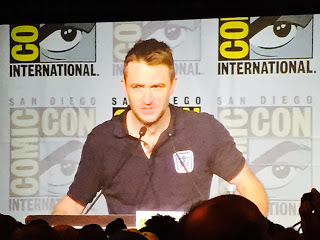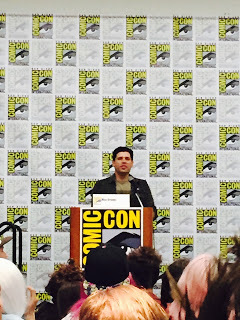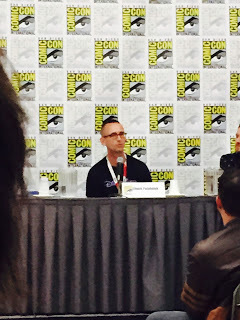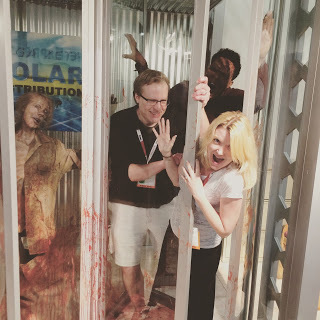I Heart Process
I finally get it. I’ve heard it for years, going back to when I first came out to LA to be an actress. Process. It’s all about the process. Find joy in the process and you will find your way to success. I waved that advice off for a long time. When I was a naïve twenty something the result was my focus. “But I want the result!” Twenty- year-old Beth said. I didn’t want to think about the journey. I just wanted to be there already.
I didn’t get it.
And of course I didn’t get anywhere. Of course I didn’t. I didn’t embrace the process. In fact I loathed it. There was a reason for this too I realize in retrospect. It was because I wasn’t doing the art that I truly loved. When I finally found my art form (writing for kids/teens), all of a sudden process became fascinating.
And over the last few years learning about process has become an obsession. I love blogs about it. I love pictures of it. Other authors, What does your workspace look like? Do you outline? Do you know the ending? What is your favorite pen? How do you create? Where? When? How? I seek out process. I seek it out because I’m always looking for things that will help me get into my story even deeper. Magic happens in the process. I heart process! I should make a tee-shirt.
Because I love it though doesn’t mean it’s easy. I struggle at points. But I do love all the steps their own way (okay maybe not the moment where I realize my first draft is crap). And I’m always looking for ways to refine the journey. It’s about figuring out the story, the moment where everything clicks, the moments the characters speak to you and give you the answers or, at the very least, hints. How can you not love that part of the process? If we just skipped to the result with no effort, the prize would feel empty. Wouldn’t it?
I just got back from San Diego Comic Con. And in the middle of it I remembered the real reason why I love going. Sure the fangirl part of me loves it there, but there’s a bigger part of me loves something else. When you go to the panels and listen to the writers of your favorite books and creators of your favorite shows, they all let you in on PROCESS. And I eat it up. You get to see how things are made. And when I see that, even when I see that from writers on shows I’ve never heard from. I become a fan. And I get excited to create. Process is about the passion and the hardwork. You see it all over the place at Comic Con. You don’t just see the result: the books and products you can buy in the exhibit hall. That’s not all I see. I see the hustle. I love seeing the hustle. It is my gasoline.
The first panel I saw this year, was The Nerdist panel, a media company run by Chris Hardwick. That man is the hardest working dude in show business. I am convinced. He has so many irons in the fire. He is constantly pushing the envelope and trying new things. He inspired the hell out of me. Remember when I said I wanted to do less? No. I am doing more. Less of what isn’t moving my passion/career forward and more of what will. Take chances. Make that leap.
 Chris Hardwick
Chris Hardwick
Max Brooks, author of World War Z, said he writes to answer his own questions. He outlines and knows the ending before he starts. Max Brooks
Max Brooks
Chuck Palahnuik, author of so many awesome books I can’t begin to name them (Fight Club being one), addressed why he doesn’t do a lot of character description and sometimes doesn’t even name his protagonist. His answer “I forget to name them.” But then he went on to say that verbs are what light us up when we are reading so for him, sometimes names of things are better to be allegorical. Also for him reading non- fiction informs his fiction writing style. And for him he doesn’t read a ton of fiction because he wanted to make mistakes and make them so big that they would work. I found that interesting. And I can see how that would work for him.
 Chuck Palahnuik
Chuck Palahnuik
Jonathan Hickman, comic book writer and artist, talked about how he would mine his own work for threads he could use later. Something would show up later that would tie into his older issues. What a great way to look like a genius! He also said he knows the ending going in. He even knows the last line. Learning about the comic book process was amazing. Sometimes he writes out an entire script exactly before giving to another artist to draw or he will write a basic outline, give to the artist to draw then when he would get it back he would write the script.
I asked Lev Grossman, author of The Magicians, about his process. He outlines diligently. He needs structure. His early drafts are terrible (I never get tired of hearing that from New York Times best sellers). Practically no dialogue or feelings. He also said because he doesn’t just write fiction full time he must find the time the write. He brings his computer everywhere. He also said to not restrict writing to just when you are at the keyboard.
And there is no right process, by the way. But gathering all the info I can informs mine all the time.
Comic Con comes in the middle of the year about the time I need a pick me up. The time I need the reminder that I love process. The time I need inspiration. And I got loads of it.
 I also get better at escaping from zombies every year.
I also get better at escaping from zombies every year.
I didn’t get it.
And of course I didn’t get anywhere. Of course I didn’t. I didn’t embrace the process. In fact I loathed it. There was a reason for this too I realize in retrospect. It was because I wasn’t doing the art that I truly loved. When I finally found my art form (writing for kids/teens), all of a sudden process became fascinating.
And over the last few years learning about process has become an obsession. I love blogs about it. I love pictures of it. Other authors, What does your workspace look like? Do you outline? Do you know the ending? What is your favorite pen? How do you create? Where? When? How? I seek out process. I seek it out because I’m always looking for things that will help me get into my story even deeper. Magic happens in the process. I heart process! I should make a tee-shirt.
Because I love it though doesn’t mean it’s easy. I struggle at points. But I do love all the steps their own way (okay maybe not the moment where I realize my first draft is crap). And I’m always looking for ways to refine the journey. It’s about figuring out the story, the moment where everything clicks, the moments the characters speak to you and give you the answers or, at the very least, hints. How can you not love that part of the process? If we just skipped to the result with no effort, the prize would feel empty. Wouldn’t it?
I just got back from San Diego Comic Con. And in the middle of it I remembered the real reason why I love going. Sure the fangirl part of me loves it there, but there’s a bigger part of me loves something else. When you go to the panels and listen to the writers of your favorite books and creators of your favorite shows, they all let you in on PROCESS. And I eat it up. You get to see how things are made. And when I see that, even when I see that from writers on shows I’ve never heard from. I become a fan. And I get excited to create. Process is about the passion and the hardwork. You see it all over the place at Comic Con. You don’t just see the result: the books and products you can buy in the exhibit hall. That’s not all I see. I see the hustle. I love seeing the hustle. It is my gasoline.
The first panel I saw this year, was The Nerdist panel, a media company run by Chris Hardwick. That man is the hardest working dude in show business. I am convinced. He has so many irons in the fire. He is constantly pushing the envelope and trying new things. He inspired the hell out of me. Remember when I said I wanted to do less? No. I am doing more. Less of what isn’t moving my passion/career forward and more of what will. Take chances. Make that leap.
 Chris Hardwick
Chris HardwickMax Brooks, author of World War Z, said he writes to answer his own questions. He outlines and knows the ending before he starts.
 Max Brooks
Max BrooksChuck Palahnuik, author of so many awesome books I can’t begin to name them (Fight Club being one), addressed why he doesn’t do a lot of character description and sometimes doesn’t even name his protagonist. His answer “I forget to name them.” But then he went on to say that verbs are what light us up when we are reading so for him, sometimes names of things are better to be allegorical. Also for him reading non- fiction informs his fiction writing style. And for him he doesn’t read a ton of fiction because he wanted to make mistakes and make them so big that they would work. I found that interesting. And I can see how that would work for him.
 Chuck Palahnuik
Chuck PalahnuikJonathan Hickman, comic book writer and artist, talked about how he would mine his own work for threads he could use later. Something would show up later that would tie into his older issues. What a great way to look like a genius! He also said he knows the ending going in. He even knows the last line. Learning about the comic book process was amazing. Sometimes he writes out an entire script exactly before giving to another artist to draw or he will write a basic outline, give to the artist to draw then when he would get it back he would write the script.
I asked Lev Grossman, author of The Magicians, about his process. He outlines diligently. He needs structure. His early drafts are terrible (I never get tired of hearing that from New York Times best sellers). Practically no dialogue or feelings. He also said because he doesn’t just write fiction full time he must find the time the write. He brings his computer everywhere. He also said to not restrict writing to just when you are at the keyboard.
And there is no right process, by the way. But gathering all the info I can informs mine all the time.
Comic Con comes in the middle of the year about the time I need a pick me up. The time I need the reminder that I love process. The time I need inspiration. And I got loads of it.
 I also get better at escaping from zombies every year.
I also get better at escaping from zombies every year.
Published on July 13, 2015 13:27
No comments have been added yet.



